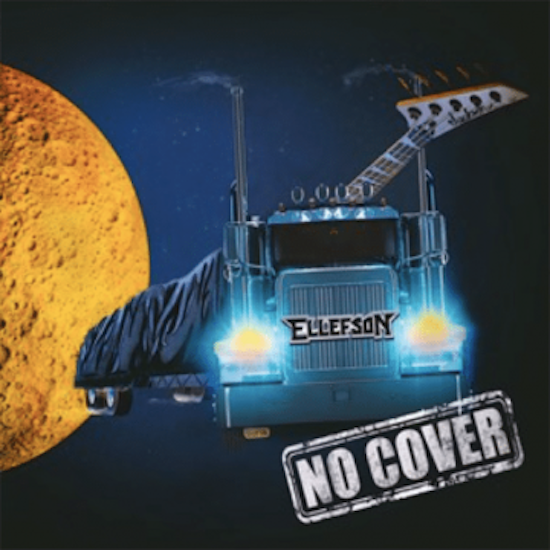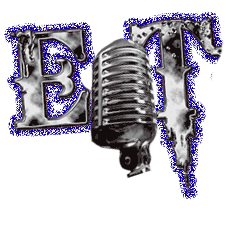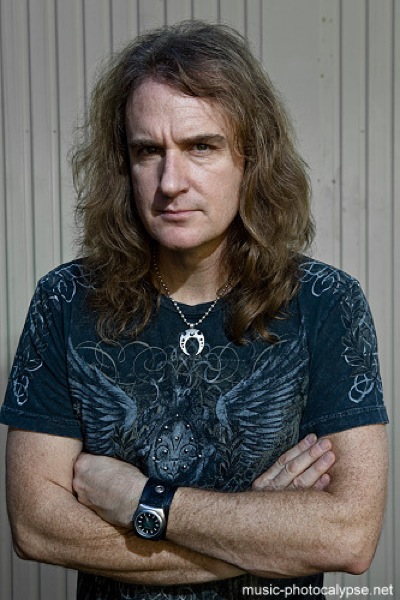Ruben Mosqueda of Sleaze Roxx spoke with Megadeth bassist Dave Ellefson about his new album, No Cover. which was released on November 26th through his imprint EMP Label Group.
Sleaze Roxx: No Cover is a two disc set. Was the original vision to do one disc worth of material?
David Ellefson: When we started out, it started off as who knows what? We didn’t know if we were going to do a couple of songs and release them digitally online or maybe they would be used as b-side for the next Ellefson solo album which is going to be mostly all original material. We didn’t really know initially, then after a couple of phone conversations we were seven to eight songs into this thing and it quickly started to look like at least one record or one disc. One week into the thing, we were looking at 15+ songs [laughs]! As Thom [Hazaert] started laying down the format of the track listing, we were like ‘Why leave one or two off?’ So we went ahead and included everything, including the bonus track — the Cheap Trick cover Down which has Chip Z’Nuff on guest vocals. That’s like the “Easter Egg” on the album.
So now, it was a double CD and four side vinyl. That seriously ramped up the costs. Since this is a covers album, we also had to go through all of the proper channels to secure all of the proper music licenses. Honestly, it was quite an expensive endeavor [laughs]! We went to the mat on this. Then again, that’s how it always is with Thom and I. We started the coffee company. I figured some guy would put my name on it and I would get a check in the mail. Now I’m the one that is filling the bags and stuffing the coffee [laughs]. I honestly like it, because it’s pride of ownership. When your name is on the door, you’re the one that does the most work. We live in an age where everyone thinks that being the boss is all about entitlement. It is the opposite. You’re the guy that shows up first and leaves last. You’re the one that turns the lights on in the morning and you’re the one that shuts them off at night when everyone else has gone home. I love it. Thom has been such a supportive partner in these endeavors and a great friend. It’s work but it beats going to work for somebody else.
Sleaze Roxx: What were some of the more challenging songs for you to perform on this record?
David Ellefson: I would say Sweet F.A. for sure. Steve Priest was this incredible bass player, great songwriter and singer. Since Steve passed away earlier this summer, I really wanted to do justice as a bass player. There were others that weren’t as difficult to play, but I wanted to execute them to perfection and those would be Not Fragile by B.T.O. [Bachman-Turner Overdrive]. I went through four to five basses until I found the right one to record that intro. It is so distinctive. It didn’t require a thrash metal bass. It has such a distinct nuance that I used one of my Musicman Stingray basses to record that so that it was really clean and had this very precise sound. I would say that another one was “Rebel
David Ellefson: I would say Sweet F.A. for sure. Steve Priest was this incredible bass player, great songwriter and singer. Since Steve passed away earlier this summer, I really wanted to do justice as a bass player. There were others that weren’t as difficult to play, but I wanted to execute them to perfection and those would be Not Fragile by B.T.O. [Bachman-Turner Overdrive]. I went through four to five basses until I found the right one to record that intro. It is so distinctive. It didn’t require a thrash metal bass. It has such a distinct nuance that I used one of my Musicman Stingray basses to record that so that it was really clean and had this very precise sound. I would say that another one was “Rebel
David Ellefson: I would say Sweet F.A. for sure. Steve Priest was this incredible bass player, great songwriter and singer. Since Steve passed away earlier this summer, I really wanted to do justice as a bass player. There were others that weren’t as difficult to play, but I wanted to execute them to perfection and those would be Not Fragile by B.T.O. [Bachman-Turner Overdrive]. I went through four to five basses until I found the right one to record that intro. It is so distinctive. It didn’t require a thrash metal bass. It has such a distinct nuance that I used one of my Musicman Stingray basses to record that so that it was really clean and had this very precise sound. I would say that another one was Rebel Yell by Billy Idol. The bass and drums really carry that song. Since you asked, I think I could also include Riff Raff. Cliff Williams has some really cool movements in his playing. As simple as we think AC/DC is, there’s a certain cleverness to every note they play. Every note on the bass and guitar is strategically placed. Nothing is there by mistake. Ian Hill is another great bass player. We did Freewheel Burning on the album. The song is from the ’80s when Tom Allom was producing their albums, which was also during Judas Priest’s big MTV era. Again, everything is strategically placed. Every note is there for a reason. Knowing that these guys are going to hear these songs was a motivator for all of us in the band to play these parts spot on.
Sleaze Roxx: Years ago, when we were in the middle of the L.A. glam era, there was this attitude like you should be on one side or another. Some bands even fueled these beliefs. How real was that? Did you guys hangout with some of the L.A. glam bands at all? Was there some level of mutual respect at all?
David Ellefson: Music was very competitive when we were coming up the ranks. There was certainly competition within the “Big Four.” That was due in part because Dave [Mustaine] used to be in Metallica, so that drove a lot of that. I think you could say that Megadeth was formed from a backlash to that, though that was never my view on it, as it went down well before I even met Dave. To me, Megadeth was a new horizon, a new day, a new band, a new venture and a new sound. We created our own sound. I think by the time we did Peace Sells, we had cemented our own sound and set our own trajectory. The thing between the Sunset Strip bands and the thrash scene was very polarizing. In fact, when I first met Dave, he said, “We’re not playing any clubs in L.A., we’re playing clubs in San Francisco.” I think that was totally the right move and it was a totally different scene.
Even when we did play L.A., we didn’t play the Sunset Strip. When we did play in the area, we didn’t play the Sunset Strip. We played Fender’s Ballroom in Long Beach, the Waters Club in San Pedro or the Balboa Theater. Those places were more of a host to the punk rock scene. These venues were off the beaten path. They were not your mainstream venues where the Hollywood “glam bands” were playing. Hollywood has so much of a different feel compared to what was going on in some of the other parts of Los Angeles. It was a different audience. It was a different fan outside of the Strip. Having said that, Poison and Megadeth were signed to Capitol Records the same week. We came in off Combat Records and they through Enigma Records. Dave and I knew C.C. [Deville] because he played in a band called The Screaming Mimi’s. They used to rehearse at the same venue as we did in Hollywood. I have nothing but the most utmost respect for Bret Michaels. He’s kind of like me. He’s a kid from back East who moved to L.A. and he’s worked hard for the career that he has. At the end of the day, we got along.
Megadeth toured with Mötley Crüe in 2000. That was a moment where that was “okay” with the two fanbases. Normally, we had a very different fanbase overall. That doesn’t mean that we aren’t friends with these guys. We have all grown up, we all have had our careers, we are all very comfortable in the ivory towers that we reside in [laughs].
In the beginning, we were all scraping to be number one. If you weren’t competitive… that’s just the nature of rock & roll. It’s like “F–k you! I’ll slit your throat to get to the top.” We all had that drive. Everyone of our bands did. We had to sell our soul to get out of the gutter and try to get to number one. That’s the story of all of our bands. As soon as we got to the top, we’d topple over the top, then we crashed and burned, then we’d have to get our s–tt together, then rebuild our bands [laughs]! Then we tried to do it right the second time. That’s ultimately the story of ’80s rock and roll, is all of the excess that came our way. If it didn’t kill us, it made us stronger.
Read more at Sleaze Roxx.



3 Responses
I have no regrets about living through the debauchery of the 80’s. It was the wildest time, and everything and everyone was completely over the top, yet somehow all this amazing music came out. The “Atmosphere” I believe did have something to do with the sound, but it unfortunately also cost us some good friends. A handful of bands like these guys realized their rock and roll dreams, but not without a price, but they’re still standing and here to tell the tale. I guess this interview just brought back a lot of memories. (I’m lucky I can remember my own name 😉 Cheers to all my 80’s survivors! We lived in a time that the youngsters couldn’t imagine (and maybe that’s for the best), but this music stands up to time extremely well IMHO.
Great interview, thanks for posting it. I was 8 to 18 during the 80’s and had a blast seeing some great acts starting when I was 14. Was a fun era and I remember all of it even when I was sideways. I saw The Crue, Whitesnake, DLR (2), Cinderella (2), Poison, Great White, MOR 88’ (2)Kingdom Come, Metallica, Dokken, Scorps. VH a couple of times. Ac/Dc, The Cult, Metallica, SRV, Huey Lewis, Beatlemania, Bod Dylan, INXS, Steel Pulse. Still have all the stubs for them. Loved the 80’s and fanzines as well.
One of the best things for the thrash music genre was Mustaine’s firing from Metallica. Although Mustaine got screwed cuz Metallica released his songs when he told them not to (regardless of him getting song credits) and never got the opportunity to first release those songs, he used his anger to fuel the success of Megadeth. Mustaine, as The Pioneer of the thrash genre, was cheated out of that opportunity which could have possibly garnered him more commercial success.
The 80’s were awesome! Trekking to Los Angeles to see shows at the clubs, reading Kerrang! and Sounds magazines, discovering the NWOBHM, meeting the woman who would eventually become my wife….